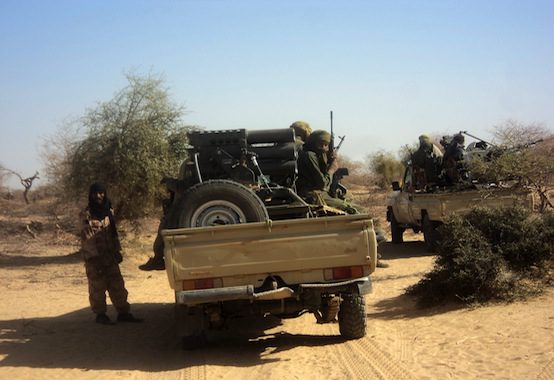In Mali, the Domino Theory Is Real

As the French military intervention in Mali nears the end of its second week, French and Malian forces have begun making slow advances into the territory controlled by several different Islamist and separatist groups. What began a year ago as a Tuareg secessionist rebellion fueled by weapons and mercenaries returning from Libya expanded into a larger war Jan. 11, when France attacked advancing Islamist forces that were moving towards Mali’s capital, Bamako. Unlike most previous Western interventions over the last two decades, France is here supporting the internationally recognized government of Mali, and its intervention has so far been welcomed by most Malians as necessary for the defense of their country. Unfortunately, French intervention now likely would not have been necessary had it not been for the intervention in Libya in 2011 that the last French president demanded and the U.S. backed. Had Western governments foreseen the possible consequences of toppling one government two years ago, there might be no need to rescue another one from disaster now.
France says it will continue fighting until the Malian government’s control over its northern territory is restored and Islamist groups are defeated, which promises to be a protracted, open-ended commitment for a nation that was already weary of its role in Afghanistan and unable to wage the war in Libya without substantial American help. The U.S. role in the conflict remains a minimal one, confined so far to intelligence assistance and logistical support. Al-Qaeda in the Islamic Maghreb (AQIM) does pose a real security threat to North and West Africa, and it could pose a threat to Europe, but the threat to the U.S. from AQIM is minimal, if it exists at all. The U.S. has far less at stake in this fight than France or the countries in the region, so it is appropriate that they bear the costs of countering that threat.
The Libyan war did not create Mali’s internal divisions, which have existed since independence, but the destabilizing effects of changing one regime in the region exacerbated many of the country’s political weaknesses. As a result, the country was effectively cut in half, its democratically-elected president was overthrown in a coup, and hundreds of thousands of its people have been forced to become refugees. Adding to the embarrassment of Western interventionists, up until then Mali had been something of the poster child for successful democratization and development in Africa. Now it is in danger of being reduced to an even more misleading caricature as “another Afghanistan” or “another Somalia.” But thinking in these terms is bound to fail. Mali’s predicament has to be understood on its own terms.
Despite broad French and Malian support for French intervention, it is far from obvious that President Hollande’s decision was a wise or well-considered one. One of the few prominent French opponents of that decision, Dominique de Villepin, voiced his doubts shortly after the intervention began:
In Mali, none of the conditions for success are met. We will fight blindfolded absent a clear objective for the war. Stopping the southward advance of the jihadists, and retaking the north, eradicating AQIM bases are all different wars. We will fight alone absent a reliable Malian partner. With the overthrow of the president in March and the prime minister in December, the collapse of the divided Malian army, and the overall state failure, on whom can we depend? We will fight in a void absent strong regional support. ECOWAS is in the rear and Algeria has signaled its reluctance.
Like Sarkozy’s decision to use force in Libya, Hollande’s decision to go to war in Mali has been a popular one and a much-needed political boost for his ailing government, but that popularity will disappear if French involvement becomes prolonged and costly. Unless Hollande limits French objectives to those that are realistic and obtainable, he will find that de Villepin was as prescient in his warnings about war in Mali as he was when he admonished the U.S. against invading Iraq.
As far as America is concerned, there is no compelling national interest that obliges the U.S. to become more involved in the conflict in Mali. One lesson of the Libyan war is that the U.S. shouldn’t join wars of choice that our allies insist on fighting. Americans should remember that one of the reasons the French are fighting in Mali is that our government agreed to support the last French-backed military adventure in Africa. What other countries in the region would suffer serious unintended consequences from doing the same thing in Mali? How many other countries have to be wrecked before American leaders acknowledge that their interventionist remedies often do more harm than good?
The Libyan intervention’s consequences in Mali tell a cautionary tale about the disaster that unnecessary war can unleash on an entire region, but most of the Obama administration’s opponents in the U.S. refuse to understand this. Instead of seeing Mali’s current woes as a warning against going to war too quickly, hawkish interventionists are already crafting a fantasy story that this is a result of excessive American passivity. This virtually guarantees that Republican hawks will keep attacking the administration for “inaction” when they could instead be trying to hold it accountable for its past recklessness in using force. Absent a credible opposition, the administration will keep receiving the benefit of the doubt from the public on foreign policy, even when it isn’t deserved.
If the U.S. learned anything from the Libyan war experience, it ought to be that our government should be far more cautious about resorting to force and much less willing to dismiss the importance of regional stability when considering how to respond to a brutal and abusive regime. Unfortunately, the bias in favor of (military) action in U.S. foreign-policy discourse makes it virtually impossible for these lessons to take hold.
Daniel Larison is a senior contributor to TAC and blogs here.
Comments